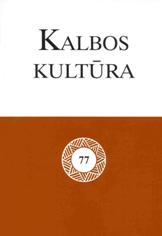Kada ką, kada kuo sekame
Which should given preference after the verb sekti: accusative or instrumental?
Author(s): Nijolė SližienėSubject(s): Language and Literature Studies
Published by: Lietuvių Kalbos Institutas
Keywords: Verb; follow; accusative; instrumental; influence; dialects; standard Lithuanian
Summary/Abstract: In standard Lithuanian as well as in dialects, the verb sekti (Eng. 'follow') is used with the accusative in the meaning of moving after a person or object (e.g. Vežimą sekė šuo, Eng. 'The cart was followed by a dog'), observing changes (e.g. Vaikai sekė medyje šokinėjančią voveraitę, Eng. 'The children were following (observing) the squirrel jumping in the tree'), following in the steps, persecution (e.g. Jį seka policija, Eng. 'Him follows the police') or taking an interest in something (e.g. Mes sekame mokslo naujienas, Eng. 'We follow the news of science'). When the verb sekti is used in the meaning of taking good examples, in standard Lithuanian it takes the instrumental case (e.g. Jis seka savo mokytoju, Eng. 'He follows his teacher'; Sekite tik gerais pavyzdžiais, Eng. 'Follow only good examples'), whereas in dialects it often occurs with the accusative. Due to the influence of dialects, the accusative often substitutes the instrumental in standard Lithuanian as well.
Journal: Bendrinė kalba (iki 2014 metų – Kalbos kultūra)
- Issue Year: 2004
- Issue No: 77
- Page Range: 40-45
- Page Count: 6
- Language: Lithuanian

